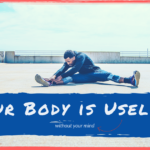In the incredibly interesting and captivating world of contract law, there is a term known as Bright Lines. This refers to the idea that when you are creating a contract or even a new law, there should be a clearly defined set of rules or standards.

The purpose is quite simple, if a time comes where a disagreement arises, there should be little to no room for varying interpretation. With the bright lines in place, it becomes very easy to produce predictable results. If things ever do get confusing, there is a clear set of rules and expectations to rely on. There is no misunderstanding or discrepancy.
Bright lines are incredibly helpful in the realm of law, but the concept itself is also super practical for how we think about behaviour change.
The bright lines of life
When it comes to starting or stopping a new habit, most people have a tendency to lean towards ambiguity. They do this, either consciously or unconsciously, because it gives them a way out. When you do not set clearly defined rules for a specific action, the interpretation of doing things “correctly” becomes easier to argue against.
I personally do this all the time, and it often comes about when I’m trying to limit desserts or the sugary crap. The way I do this is by committing to something vague like, “I want to eat less sugary stuff.”
But what does “less sugary stuff” even mean?
How much is less?
And what exactly is sugary stuff?
When I make a commitment like this, I’m essentially signing up for failure. Because if I’m being honest with myself, I know that when I’m 3 weeks into my decision to “eat less sugary stuff” and I find myself passing a Dairy Queen on my way home from the gym (when my willpower is most significantly depleted), a little voice inside my head is going to whisper softly, “You worked hard today, you deserve a treat.” – and in the face of all that, I’m going to listen.
But is that even surprising? I mean, if I don’t make my commitment seriously and clearly define what I want, my future self is just going to try to rationalize every possible excuse as to why it’s no biggie if I take a day off.
The real heart of the matter when it comes to making a commitment towards changing a behaviour, is that you have to ask yourself some serious questions.
Do I REALLY want this?
Is it actually worth it?
Do I even care?

And here’s the other thing – if your answer to all of those questions is NO, that’s fine. If you are happy with the ways things are, you should just stop reading right now. Go back to being happy with what you got. There’s nothing wrong with that.
BUT if you are dead serious about making a change; if you have goals, ambitions, and things you want to improve; if you are sick and tired of catching yourself in a rut and you hate the feeling of being stuck in the loop of self-defeat.
If that is the case, then let me make things simple for you. If you really want change, there can be no room for ambiguity. You have to set up bright lines and clearly defined expectations.
You are either in or out. Committed or casual. Moving forward or Stuck.
There is no in between.
Consider the following examples that a typical athlete might encounter:
- You might say that you want to eat healthier.
- You might say that you want to be a better teammate.
- You might say that you want to get stronger.
But what do any of those really mean?
- What does eating healthier look like on a daily basis? Does that mean eating more vegetables, more fruits, less candy, less processed food? Are you going to eat like an athlete or an average human being? Do you want to start by eating a healthy meal once per day? Twice per day? Every meal?
- What, exactly, does a better teammate look like? What personal qualities do you have that would make you a better teammate? How will you know you are being better? Who can you look to for inspiration?
- When will you know if you’ve become stronger? Is your goal to get stronger, faster, quicker, or more powerful? Which lifts to you want to increase weight on? How many times per week will you go to the gym?
These may seem like pestering questions to consider, but they matter. Without any clearly defined bright lines, you are almost guaranteed to let yourself off the hook. Now, you don’t have to micromanage every single detail, but in order to get things started, you need to set up simple rules.
Consider the following adjustments:
- I will eat vegetables with every meal, and have 2 servings of fruit each day.
- Each day of practice I will choose one teammate to specifically encourage.
- During the offseason, I will lift weights 4 times and run five miles 3 times per week.

These changes are subtle. They aren’t huge drastic adjustments, but instead, they are small incremental steps in the right direction. And by mastering each one to the point that it becomes easy, you can take another step forward. Cut out all processed food, go for coffee with a new teammate each week, run eight miles – whatever the next level up is.
The final decision
The common motivational quote I hear in regards to taking action is that you need to change your should’s to must’s. And that’s 100% true. But once you’ve decided to tweak your phrasing, it’s time to move on to tweaking your expectations. If you are going to start saying I must eat healthier, what does that actually mean? It’s time to change the rules and lay down some laws. Start thinking of your values like a contract, there should be no room for misinterpretation.
This time around, if you really, genuinely, actually, definitely, totally, and seriously want to make a change – you are going to have to set up clearly defined lines.
That way, when your willpower is depleted and you are feeling mentally weak, you will know very clearly if you are allowed to eat the cookie or to say bye, bye to the cookie.
– Derek
* * *
Looking for a way to create your bright lines and hold yourself more accountable? On Monday, we are getting set to release a simple tool that you can implement into your daily routine. Best of all, it only takes up about 5-10 minutes of your time each day. Stick around and find out.




